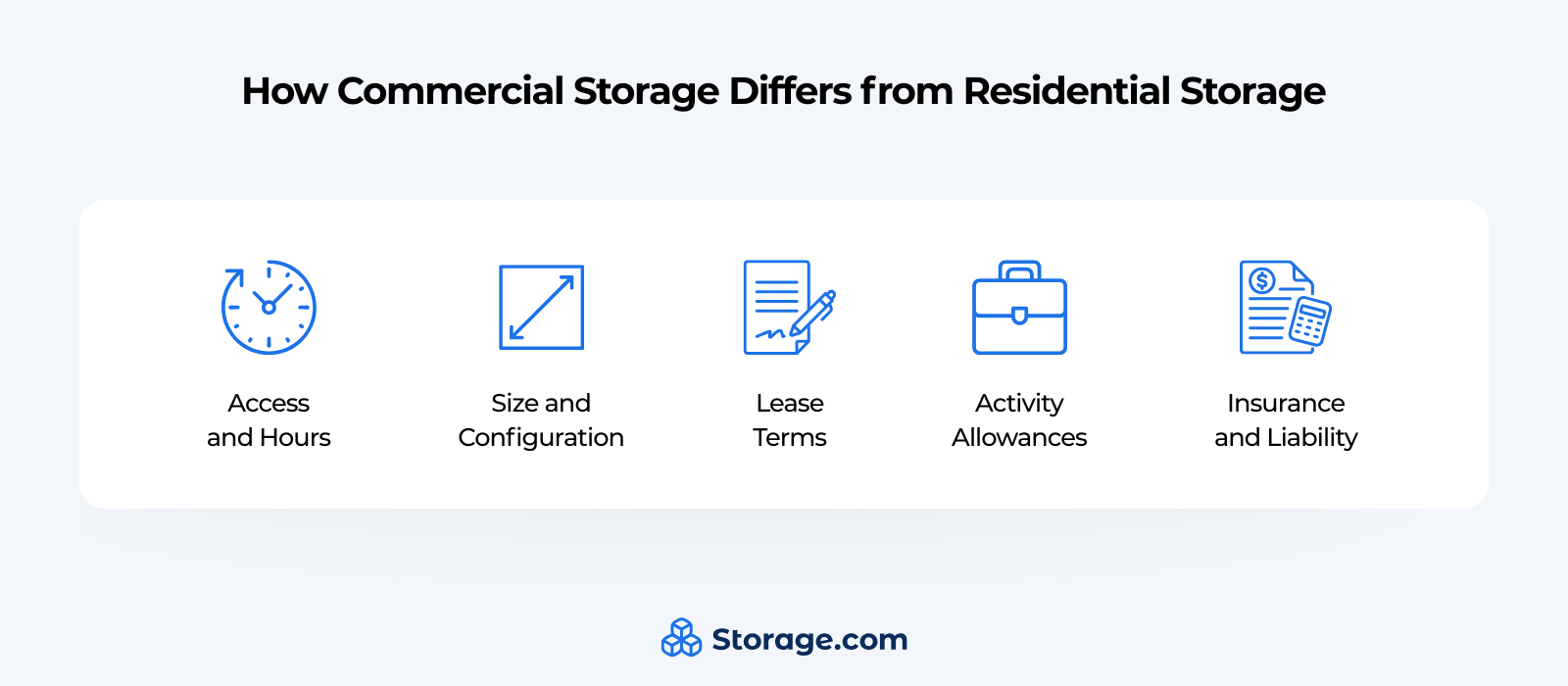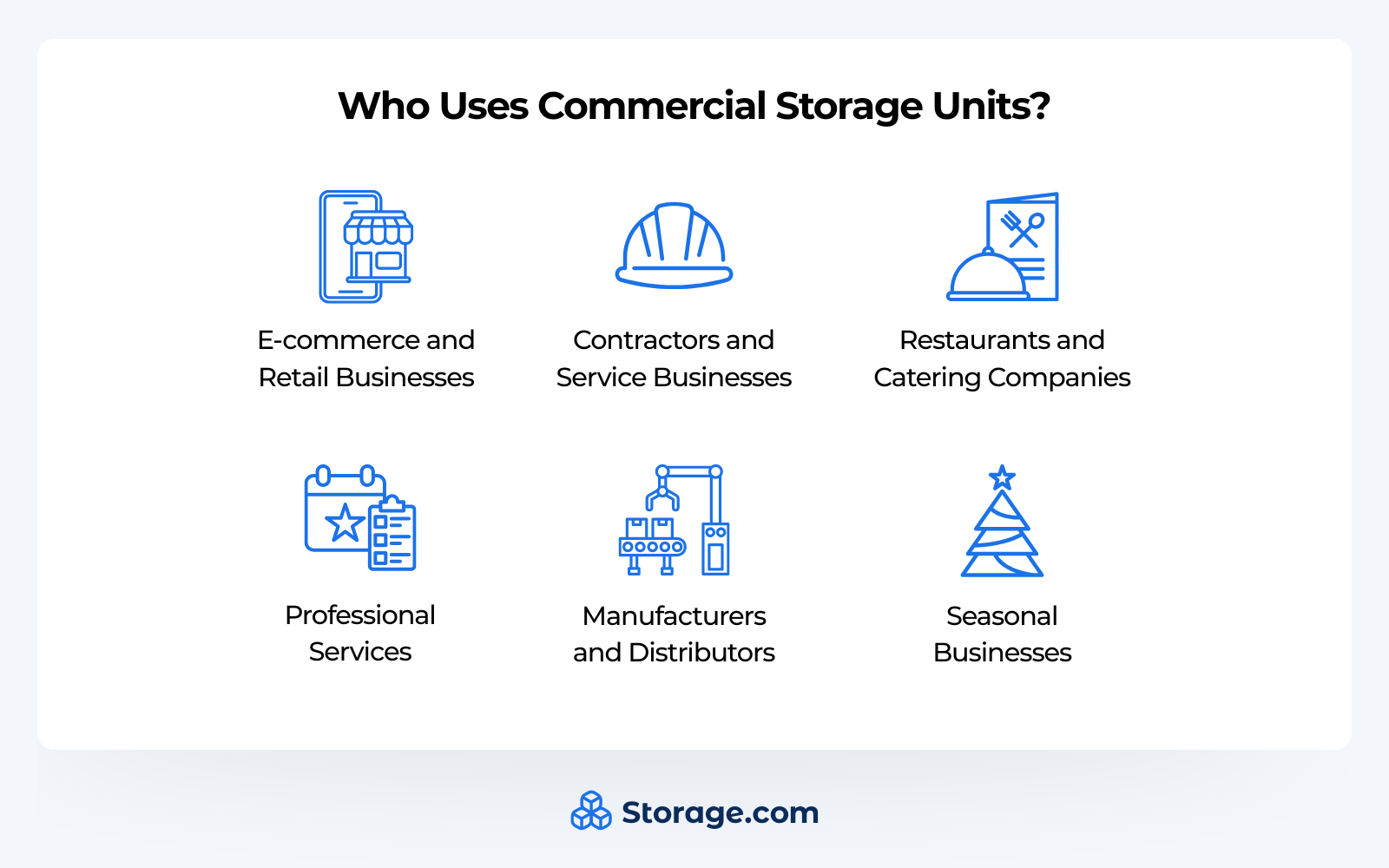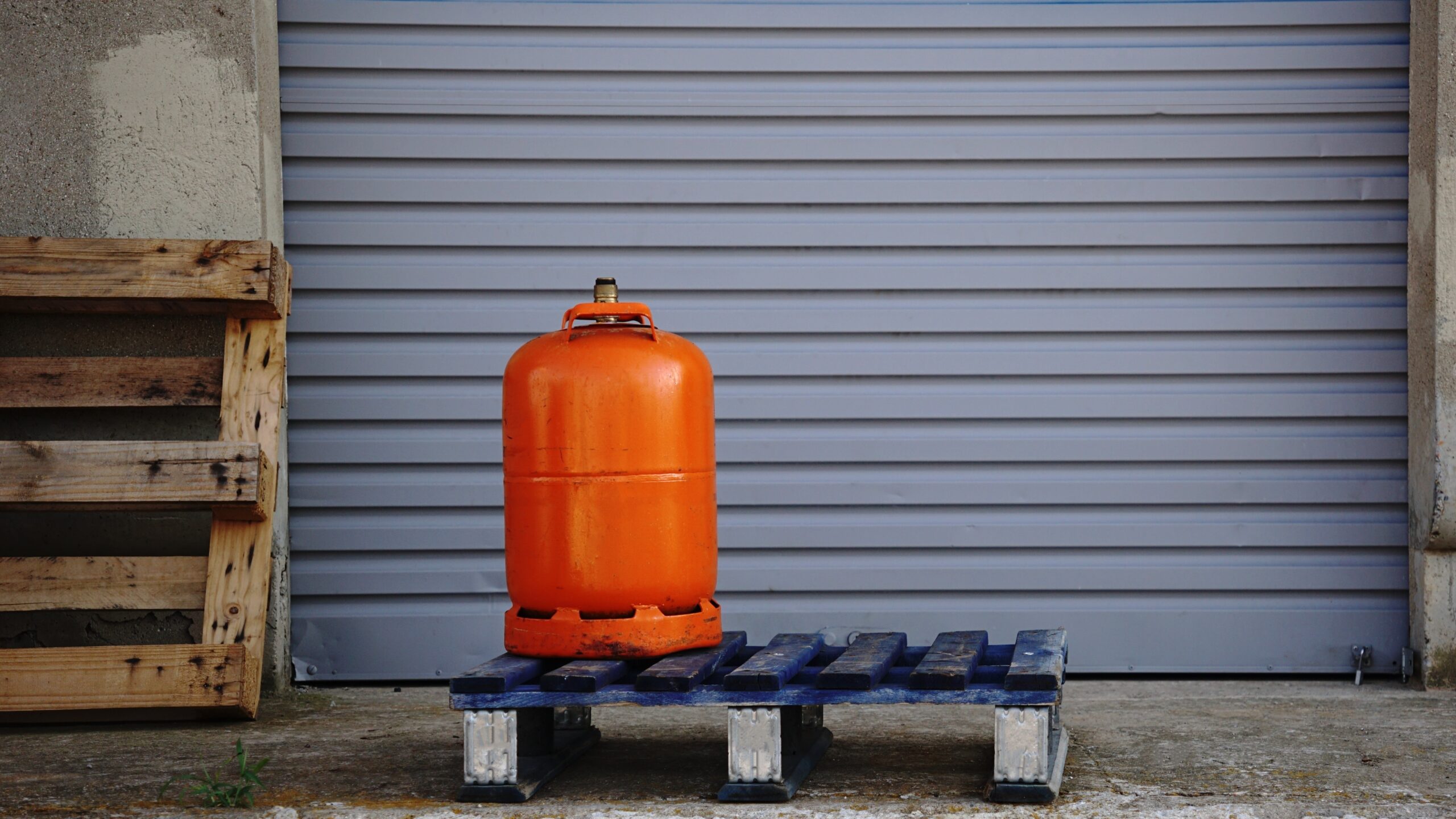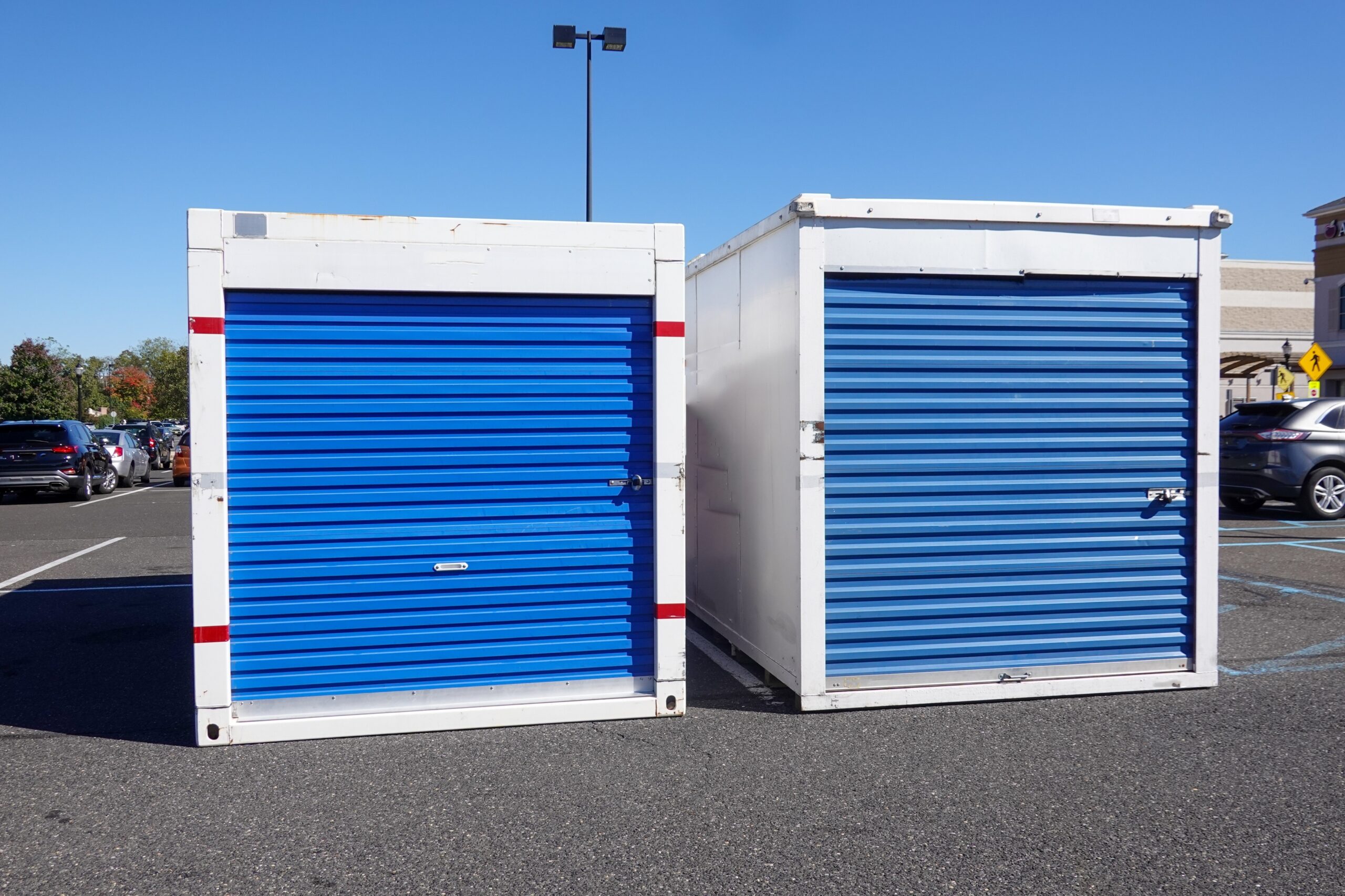Article takeaways
- Commercial storage is built for business: Unlike residential storage, commercial storage units are designed to handle business inventory, equipment, and operations with features like extended access, larger sizes, and activity allowances.
- Access and flexibility matter: Commercial storage typically offers 24/7 or extended access hours and allows business activities within units, which is usually prohibited in residential storage.
- Multiple storage types available: Options range from standard units to storage warehouse rental, commercial vehicle storage, and climate-controlled spaces, each serving different business needs.
If you’re running a business—whether it’s a side hustle, a growing startup, or an established company- you’ve probably hit the point where you need more space. Maybe your inventory is taking over your garage, your equipment won’t fit in the office, or you need somewhere to park that work van or food truck overnight. That’s where commercial storage units come in.
But what exactly are commercial storage units, and how are they different from the regular storage units most people use for household stuff? Let’s break it down.
Commercial Storage Units: The Basics
Commercial storage units are rental storage spaces specifically designed for business use. While they operate on the same basic principle as residential storage—you rent space, you store your stuff—they’re built to handle the unique needs of businesses.
Think of commercial storage as storage on steroids. These units accommodate everything from inventory and equipment to commercial vehicles and business documents. They’re where businesses keep the things they need but don’t have room for at their primary location.
The key difference? Commercial storage units typically offer features and services that businesses require, like extended access hours, higher security levels, loading docks, and the ability to receive deliveries. Many facilities also allow business activities within the unit, such as light assembly, packing orders, or organizing inventory—activities that would typically be off-limits in residential storage.
How Commercial Storage Differs from Residential Storage

Here’s where things get interesting. While both types of storage involve renting a space to keep your belongings, commercial and residential storage serve different purposes and come with different rules.
Access and Hours
Residential storage often has limited access hours—maybe 6 AM to 9 PM, or gate hours that close overnight. Commercial storage units usually offer 24/7 access or, at a minimum, extended hours that align with business operations. When you need to grab inventory at 10 PM to fulfill an overnight order, that access matters.
Size and Configuration
Commercial units often come in larger sizes and different configurations than residential options. You’ll find units specifically designed for palletized storage, with ceiling heights that accommodate forklifts and pallet jacks. Some facilities offer storage warehouse rental with loading docks, drive-up access, and wide hallways that can handle commercial vehicles and equipment.
Lease Terms
Residential storage typically operates on month-to-month leases with straightforward pricing. Commercial storage can offer more flexible arrangements, including long-term leases with negotiated rates, especially for larger spaces or multiple units. Businesses often need predictability in their overhead costs, so longer-term agreements can benefit both parties.
Activity Allowances
This is a big one. Most residential storage agreements prohibit conducting business in your unit. You can’t use it as a workspace, can’t operate a business from it, and definitely can’t have customers or clients visiting. Commercial storage units often allow these activities. You might be able to use your unit for light assembly, as a staging area for a service business, or as a fulfillment center for an e-commerce operation.
Insurance and Liability
Commercial storage typically requires different insurance coverage than residential storage. Business property insurance works differently from homeowners’ or renters’ insurance, and facilities often have specific requirements for commercial tenants to protect against liability related to business operations.
Types of Commercial Storage Units
Commercial storage isn’t one-size-fits-all. Depending on what your business needs, you’ll find different types of storage options designed for specific purposes.
Standard Commercial Units
These look similar to residential units but typically come in larger sizes and with commercial-friendly features. They’re climate-controlled, secure, and accessible. Perfect for inventory, equipment, documents, or seasonal items your business doesn’t need daily access to.
Commercial Vehicle Storage
This is a major category worth understanding. Commercial vehicle storage includes spaces for work vans, trucks, trailers, company cars, and specialized vehicles like food trucks or mobile service units. This storage can be indoor (enclosed units or warehouse space) or outdoor (covered or uncovered parking spaces).
Commercial vehicle storage solves several problems at once. It keeps your vehicles secure overnight, provides a professional alternative to parking them at your home, and in many cases, offers maintenance areas where you can service your fleet. Some facilities even offer hookups for refrigerated trailers or specialized equipment.
Storage Warehouse Rental
For businesses needing significant space, storage warehouse rental offers large-scale solutions. These are substantial spaces—think thousands of square feet—that function almost like your own private warehouse. They often include features like:
- Loading docks and bay doors
- High ceilings for vertical storage
- Forklift access and pallet storage capability
- Office space within the unit
- Separate receiving areas
- Climate control for sensitive inventory
Storage warehouse rental makes sense for businesses with substantial inventory, those distributing products, or companies that need dedicated space for operations without committing to a traditional commercial lease.
Climate-Controlled Commercial Storage
If your business deals with temperature-sensitive items—electronics, pharmaceuticals, food products, documents, artwork, or certain types of equipment—climate-controlled commercial storage is essential. These units maintain consistent temperature and humidity levels year-round, protecting your inventory from damage that could cost you serious money.
Outdoor Storage Yards
Some businesses need secure outdoor space for equipment, materials, or vehicles that don’t require enclosed storage. Construction companies might store scaffolding, contractors might keep trailers and equipment, or landscaping businesses might need space for bulk materials. Outdoor storage yards offer fenced, often monitored spaces at lower costs than enclosed units.
Who Uses Commercial Storage Units?

The short answer? Pretty much every type of business at some point. Here’s a snapshot of common users:
E-commerce and Retail Businesses
Online sellers and retailers use commercial storage for inventory management. It’s often more cost-effective than warehousing, especially for small to medium-sized operations. You can receive shipments directly at the facility, organize inventory, and even fulfill orders from your unit if the facility allows it.
Contractors and Service Businesses
Plumbers, electricians, HVAC technicians, and other tradespeople use commercial storage for tools, equipment, and supplies. It’s also common for commercial vehicle storage—keeping work vans and trucks secure when they’re not on job sites.
Restaurants and Catering Companies
These businesses often need extra space for equipment, supplies, or seasonal items. Food trucks and mobile catering operations frequently use commercial vehicle storage during off-hours or off-seasons.
Professional Services
Accountants, lawyers, consultants, and other professionals use commercial storage primarily for document retention. Rather than paying premium office rent for file storage, they keep archives in secure commercial units.
Manufacturers and Distributors
Small manufacturers might use storage warehouse rental as an affordable production space, while distributors use it for inventory staging and order fulfillment.
Seasonal Businesses
Any business with seasonal fluctuations—landscaping, snow removal, event planning—needs somewhere to keep equipment and inventory during off-seasons. Commercial storage provides that flexibility without the year-round overhead of dedicated facilities.
What to Look for in Commercial Storage
If you’re shopping for commercial storage units, here are the key factors to consider:
Location
Proximity matters for business. Calculate how often you’ll need to access your unit and choose accordingly. If it’s daily, staying within 10-15 minutes of your primary location makes sense. For weekly access, you might prioritize value over convenience.
Security Features
Business assets need protection. Look for facilities with gate access codes, individual unit alarms, video surveillance, and on-site management. Some high-end facilities offer biometric access and monitored security systems.
Access Hours
Match the facility’s access hours to your business needs. If you operate odd hours or need flexibility, 24/7 access is worth paying extra for.
Size and Scalability
Think about growth. It’s easier to start with a unit that gives you room to expand than to deal with moving to a larger space six months in. Ask about the facility’s policy for upgrading to larger units.
Features and Amenities
Does the facility offer what your business needs? Loading docks or drive-up access, electricity in units, Wi-Fi availability, package acceptance, hand trucks and dollies, or even conference room access for occasional client meetings?
Cost Structure
Understand exactly what you’re paying for. Is insurance included or additional? Are there fees for after-hours access? What about administrative fees or rate increase policies? Commercial leases can be negotiable, especially for larger spaces or longer commitments.
The Bottom Line on Commercial Storage
Commercial storage units bridge the gap between outgrowing your current space and committing to expensive commercial real estate. They offer businesses the flexibility to scale operations, secure assets, and manage inventory without the overhead of traditional warehousing or retail space.
Whether you need storage warehouse rental for a growing product line, commercial vehicle storage for your fleet, or just a secure place to keep equipment and supplies, commercial storage provides solutions tailored to business needs. The key is understanding exactly what your business requires and finding a facility that checks those boxes.
For many businesses, commercial storage isn’t just convenient—it’s essential. It’s the difference between turning down opportunities because you’re out of space and being able to say yes to growth. It keeps your operation professional, your assets secure, and your overhead manageable.
Find the Right Commercial Storage Solution
Ready to solve your business storage challenges? Storage.com makes it simple to find commercial storage units that match your specific needs. Search by location, compare sizes and prices, check out facility features, and read reviews from other business owners. Whether you need space for inventory, equipment, vehicles, or documents, we’ll help you find a facility that works for your business and your budget.
Filter your search by the features that matter most—24/7 access, climate control, loading docks, or commercial vehicle storage options. Get transparent pricing, see photos of facilities, and book online in minutes. Your business deserves storage that supports your success, not holds it back. Start your search today and find the commercial storage solution that lets you focus on what you do best—running your business.






